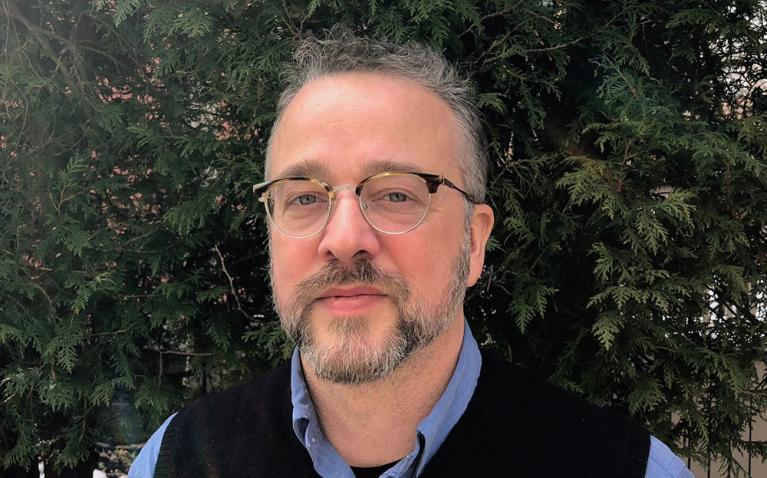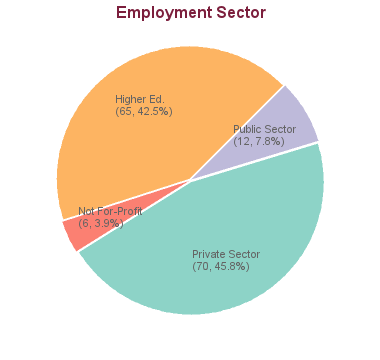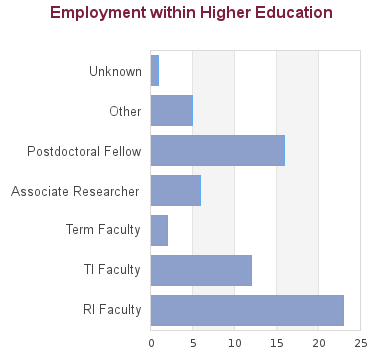
Peter Caravan
Job Title
Co-Director, Institute for Innovation in Imaging and Associate Professor of Radiology
Employer
Massachusetts General Hospital and Harvard Medical School

Review details about the recently announced changes to study and work permits that apply to master’s and doctoral degree students. Read more
In the Chemistry department Faculty, graduate students, postdoctoral fellows, undergraduates and staff members work cooperatively in a collegial environment to tackle some of the world's most pressing problems related to energy, health and sustainability.
Research areas in the department cover a wide range of subject matter, including applied chemistry, chemical synthesis, biological chemistry, environmental chemistry, chemical analysis, materials chemistry, chemical physics and theoretical chemistry.
All students admitted into our graduate program will receive a competitive stipend. Tuition fees are paid for all qualifying PhD students, as part of complete multi-year funding packages that also include funding via Teaching Assistantships (TA) and Graduate Research Assistantships (GRA).
Outstanding facilities and resources accommodate more than 500 graduate students, postdoctoral fellows and faculty that call the Department of Chemistry home. The Department has one of the most comfortable and up-to-date research spaces in North America.
The Faculty of Graduate and Postdoctoral Studies establishes the minimum admission requirements common to all applicants, usually a minimum overall average in the B+ range (76% at UBC). The graduate program that you are applying to may have additional requirements. Please review the specific requirements for applicants with credentials from institutions in:
Each program may set higher academic minimum requirements. Please review the program website carefully to understand the program requirements. Meeting the minimum requirements does not guarantee admission as it is a competitive process.
Applicants from a university outside Canada in which English is not the primary language of instruction must provide results of an English language proficiency examination as part of their application. Tests must have been taken within the last 24 months at the time of submission of your application.
Minimum requirements for the two most common English language proficiency tests to apply to this program are listed below:
Overall score requirement: 92
Reading
23
Writing
22
Speaking
22
Listening
23
Overall score requirement: 6.5
Reading
6.0
Writing
6.0
Speaking
6.0
Listening
6.0
Some programs require additional test scores such as the Graduate Record Examination (GRE) or the Graduate Management Test (GMAT). The requirements for this program are:
The GRE is required by some applicants. Please check the program website.
Deadline to submit online application. No changes can be made to the application after submission.
Transcript DeadlineDeadline to upload scans of official transcripts through the applicant portal in support of a submitted application. Information for accessing the applicant portal will be provided after submitting an online application for admission.
Referee DeadlineDeadline for the referees identified in the application for admission to submit references. See Letters of Reference for more information.
All applicants have to submit transcripts from all past post-secondary study. Document submission requirements depend on whether your institution of study is within Canada or outside of Canada.
A minimum of two references are required for application to graduate programs at UBC. Each graduate program determines the type of reference (e.g. academic, professional) and number of references they require which can range from 2 to 4. References should be requested from individuals who are prepared to provide a report on your qualifications for the program.
Many programs require a statement of interest, sometimes called a "statement of intent", "description of research interests" or something similar.
Students in research-based programs usually require a faculty member to function as their thesis supervisor. Please follow the instructions provided by each program whether applicants should contact faculty members.
Permanent Residents of Canada must provide a clear photocopy of both sides of the Permanent Resident card.
All applicants must complete an online application form and pay the application fee to be considered for admission to UBC.
Applicants who are interested in the production, preparation, and application of nuclear isotopes for science and medicine may consider the IsoSiM program. Applicants who are interested in quantum materials may consider the QuEST program.
| Fees | Canadian Citizen / Permanent Resident / Refugee / Diplomat | International |
|---|---|---|
| Application Fee | No application fee | $60.00 |
| Tuition * | ||
| Installments per year | 3 | 3 |
| Tuition per installment | $1,875.34 | $3,294.66 |
| Tuition per year (plus annual increase, usually 2%-5%) | $5,626.02 | $9,883.98 |
| Int. Tuition Award (ITA) per year (if eligible) | $3,200.00 (-) | |
| Other Fees and Costs | ||
| Student Fees (yearly) | $1,144.10 (approx.) | |
| Costs of living | Estimate your costs of living with our interactive tool in order to start developing a financial plan for your graduate studies. | |
Applicants to UBC have access to a variety of funding options, including merit-based (i.e. based on your academic performance) and need-based (i.e. based on your financial situation) opportunities.
All full-time students who begin a UBC-Vancouver Ph.D. program in Chemistry will receive a funding package of at least $26,000 for each of the first five years of their program (contingent on satisfactory teaching and research performance). The funding package may consist of any combination of internal or external awards, teaching-related work, research assistantships, and graduate academic assistantships. In addition to this salary, Ph.D. students receive full tuition awards paid for by funds from the Graduate Student Initiative and the Faculty of Science for the first five years of the program.
This results in a net balance (any funding provided to the student minus tuition and fees) mean of $29,279 and median of $27,622.
All applicants are encouraged to review the awards listing to identify potential opportunities to fund their graduate education. The database lists merit-based scholarships and awards and allows for filtering by various criteria, such as domestic vs. international or degree level.
Many professors are able to provide Research Assistantships (GRA) from their research grants to support full-time graduate students studying under their supervision. The duties constitute part of the student's graduate degree requirements. A Graduate Research Assistantship is considered a form of fellowship for a period of graduate study and is therefore not covered by a collective agreement. Stipends vary widely, and are dependent on the field of study and the type of research grant from which the assistantship is being funded.
Graduate programs may have Teaching Assistantships available for registered full-time graduate students. Full teaching assistantships involve 12 hours work per week in preparation, lecturing, or laboratory instruction although many graduate programs offer partial TA appointments at less than 12 hours per week. Teaching assistantship rates are set by collective bargaining between the University and the Teaching Assistants' Union.
Academic Assistantships are employment opportunities to perform work that is relevant to the university or to an individual faculty member, but not to support the student’s graduate research and thesis. Wages are considered regular earnings and when paid monthly, include vacation pay.
Canadian and US applicants may qualify for governmental loans to finance their studies. Please review eligibility and types of loans.
All students may be able to access private sector or bank loans.
Many foreign governments provide support to their citizens in pursuing education abroad. International applicants should check the various governmental resources in their home country, such as the Department of Education, for available scholarships.
The possibility to pursue work to supplement income may depend on the demands the program has on students. It should be carefully weighed if work leads to prolonged program durations or whether work placements can be meaningfully embedded into a program.
International students enrolled as full-time students with a valid study permit can work on campus for unlimited hours and work off-campus for no more than 24 hours a week during academic sessions.
A good starting point to explore student jobs is the UBC Work Learn program or a Co-Op placement.
Students with taxable income in Canada may be able to claim federal or provincial tax credits.
Canadian residents with RRSP accounts may be able to use the Lifelong Learning Plan (LLP) which allows students to withdraw amounts from their registered retirement savings plan (RRSPs) to finance full-time training or education for themselves or their partner.
Please review Filing taxes in Canada on the student services website for more information.
Applicants have access to the cost estimator to develop a financial plan that takes into account various income sources and expenses.
192 students graduated between 2005 and 2013: 3 graduates are seeking employment; 5 are in non-salaried situations; for 31 we have no data (based on research conducted between Feb-May 2016). For the remaining 153 graduates:


These statistics show data for the Doctor of Philosophy in Chemistry (PhD). Data are separated for each degree program combination. You may view data for other degree options in the respective program profile.
| 2023 | 2022 | 2021 | 2020 | 2019 | |
|---|---|---|---|---|---|
| Applications | 231 | 478 | 590 | 260 | 229 |
| Offers | 51 | 47 | 76 | 56 | 46 |
| New Enrolment | 30 | 34 | 47 | 32 | 26 |
| Total Enrolment | 200 | 207 | 209 | 191 | 194 |
Students in research-based programs usually require a faculty member to function as their thesis supervisor. Please follow the instructions provided by each program whether applicants should contact faculty members.
These videos contain some general advice from faculty across UBC on finding and reaching out to a supervisor. They are not program specific.
| Year | Citation |
|---|---|
| 2022 | Dr. Ren challenged the accepted dogma that molecular catalysts are not capable of converting carbon dioxide to useful chemicals at commercial scales. His research reveals a new approach to designing catalysts and prompts the solar fuels communities to study molecular catalysts in a flow regime, thereby opening an entirely new area of chemistry. |
| 2022 | Dr. Lee focused on the development and investigation of new methodologies for the syntheses of fluorinated motifs using fluorinated gases in efficient one-pot processes. The invention of these methods to easily access high-value organofluorine compounds has significant impact on pharmaceutical, agrochemical, and materials industry. |
| 2022 | Dr. Wright explored novel reactions for modifying polymers using light and oxygen. Working alongside amazing collaborators across chemistry, physics, chemical engineering, and microbiology, his research culminated in the development of fabric coatings that can kill bacteria and the SARS-CoV-2 virus when exposed to light. |
| 2022 | Dr. Hean designed organic crystalline material systems that converted light energy into mechanical motion. This research further advances the field of material sciences with an emphasis on light driven actuators. |
| 2022 | Dr. Chaudhry studied the interactions between small molecules and large ring-shaped structures for sensing applications. He also explored the liquid crystalline properties of a few of these complexes. |
| 2022 | Dr. Pryyma developed laboratory-based methods for the production of targeted cancer therapies derived from the death-cap mushroom toxin, alpha-amanitin. In contrast to chemotherapy, these therapeutics deliver cytotoxic compounds selectively to malignant cells, sparing healthy tissues and presenting a new approach to treating cancer. |
| 2022 | Dr. Li investigated the folding-unfolding mechanisms of four important metalloproteins at the single-molecule level. These studies revealed some fundamental principles that guide the folding-unfolding processes of metalloproteins in general. |
| 2022 | Dr. Ingham's work involves the development of drugs based on radioactive metal atoms. He synthesized the metal grabbing components that these drugs require and tested them with several radioactive metals. His components were found to wrap around radioactive metals within minutes at room temperature, making radioactive drugs easier to assemble. |
| 2022 | Dr. Yazdani developed three sets of new infection-resistant coatings with outstanding performance for medical devices such as urinary catheters that combat infections associated with device implantation/surgery over the long-term. |
| 2022 | Ice nucleating substances can initiate ice formations in clouds and affect the properties of clouds and climate. Dr. Xi studied ice nucleating substances sourced from high latitude regions, including biological materials and mineral dust. Her work contributes to our understanding of climate and climate feedback in high latitude regions. |
Chemistry covers a wide range of subject matter, from synthetic organic chemistry to chemical physics and theory, including inorganic, organic, analytical, biological, physical, theoretical, nuclear, environmental, and materials chemistry.
Departments/Programs may update graduate degree program details through the Faculty & Staff portal. To update contact details for application inquiries, please use this form.

Find out how Vancouver enhances your graduate student experience—from the beautiful mountains and city landscapes, to the arts and culture scene, we have it all. Study-life balance at its best!